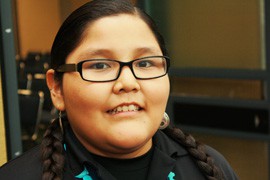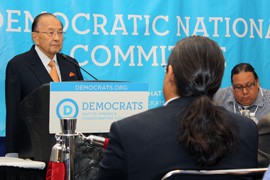Cronkite News has moved to a new home at cronkitenews.azpbs.org. Use this site to search archives from 2011 to May 2015. You can search the new site for current stories.
Native Americans speak out at the Democratic National Convention
CHARLOTTE, N.C. – Kyle Blackhorse, a 16-year-old from Ahwatukee, has enjoyed politics for a long time. He likes meetings, he likes thinking about the issues.
Blackhorse, a member of the Navajo, Tlingit and Yurok tribes, doesn’t like to just talk. He wants to do something about the major issues facing the Native American community.
Blackhorse, his mother Lisa and about 100 other people, many of them Native American leaders from across the country, packed into a small room Wednesday at the Democratic National Convention for the Native American Council meeting.
They heard tribal leaders, U.S. representatives and a U.S. senator talk about the problems facing Native Americans across the country.
Blackhorse said the meeting reinforced his desire to work for change in his community.
“We got a lot of kids, they just need the opportunity of education and someone there for them,” he said. “There’s so much they can do, it’s just no one believes in them.”
U.S. Sen. Daniel Inouye, D-Hawaii, told the attendees to “speak with one voice.”
“Are you satisfied to know that in Indian Country there are more suicides among young teenagers than anywhere else in the United States?” Inouye said. “Are you satisfied that the longevity of Indian men and women are the lowest in the United States? Then let’s do something about it.”
U.S. Rep. Gwen Moore, D-Wis., told the group she was working to stop a gap in enforcement of domestic violence on reservations that put cases of alleged non-native domestic abusers through the federal court system, not tribal courts.
“It’s a veritable sanctuary for these batterers,” Moore said. “Non-native men know they have a license to batter.”
Stephen Roe Lewis, lieutenant governor of the Gila River Indian Community and a delegate from Arizona, helped host the meeting. He said fixing problems in the Native American community start with voting.
“The important thing is the native vote,” Lewis said afterward. “That importance has been really showing more and more in certain races within the last three, four voting cycles.”
When politicians at the local, state and national level need votes in tight races, the Native American vote plays a swing role that helps get their issues heard, Lewis said.
“When those races are in play, they hear us,” he said. “Our voices are heard, and we’ve been using that very effectively in the past, I’d say, four to eight years.”
Of the 5.2 million people who identified themselves as American Indian, Alaskan Native or some combination in the 2010 Census, about 296,000 live in Arizona.
Arizona’s delegation to the Democratic National Convention also includes Ned Norris Jr., chairman of the Tohono O’odham Nation, and Diane Enos, president of the Salt River Pima-Maricopa Indian Community.
Lewis said Native Americans have made a lot of progress in the past few years. He pointed to the billions given to tribes through the American Recovery and Reinvestment Act and the permanent reauthorization of the Indian Healthcare Improvement Act as part of President Barack Obama’s health care overhaul.
“Those are milestones for Indian Country,” Lewis said. “We shouldn’t underestimate that.”
Lewis also lauded Obama’s placement of Native Americans in key administration posts, including his appointment of Dr. Yvette Roubideaux, a member of the Rosebud Sioux Tribe in South Dakota, as head of the Indian Health Service in 2009.
“Those departments that are critical to Indian issues and Indian Country, he’s put key members of Native American professionals in those staff positions,” Lewis said. “For tribes working with the federal government, that goes such a long way.”
Blackhorse sees all of these things and thinks he’s going to be part of the solution in the future. For now he’s just hoping that current leaders and their counterparts in the federal government stay focused on problems in the Native American community.
“I look around my community and we need to find that representative that can help us out of this state,” Blackhorse said. “We can be so much better if we had the right person behind us.”








